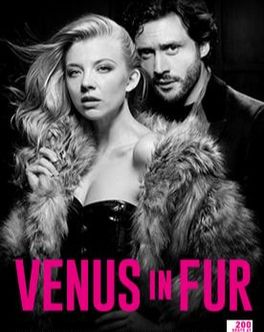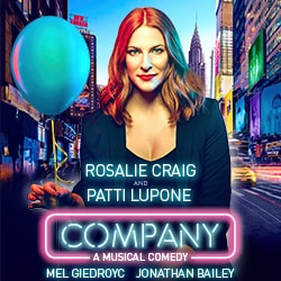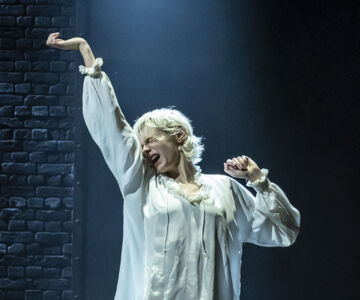 From Kyrgyzstan to Kazakhstan: In Which I Get in an Unmarked White Van And Live to Tell the Taleby Randi / October 25, 2017
From Kyrgyzstan to Kazakhstan: In Which I Get in an Unmarked White Van And Live to Tell the Taleby Randi / October 25, 2017Wooot it’s Theatre Thursday y’all! Today’s review is of the new production of “Venus in Fur” in the West End, currently playing at the Theatre Royal Haymarket until December 9.
One of the Broadway shows I most regretted missing was the play “Venus in Fur”, for which the joyous and adorable Nina Arianda won a Tony in 2012 for being the literal opposite of joyous and adorable. David Ives’s play was generally referred to as a dark and twisted psychosexual…comedy? Drama? It is both, and it is neither. And that’s really all I knew about it until I finally saw it last weekend, in the form of the new West End production starring Natalie Dormer (Game of Thrones, Tudors, you all love her) and David Oakes (whom I last saw in Shakespeare in Love, the West End play, as Marlowe). It’s not the kind of show you enjoy while it’s happening, but the kind where you can’t stop trying to figure it out after the fact, which could be the more interesting option.
I love going in to shows (and movies) cold, which is harder and harder to do nowadays with every kind of spoiler and (illegal don’t do it) videos on the internet (and with my willpower to avoid such things being nonexistent). But going in to “Venus in Fur”, all I knew was the above – that it was sexual and violent. Husband and I joked about this literally every time we mentioned the play in the run up to it, because it’s one of the funniest parts of one of our favorite movies. Seriously every conversation: “What do we have next weekend?” “Venus in Fur. It’s sexual and violent.” Or “What time is the show tonight?” “7:30. It’s sexual and violent.”
I’m glad I didn’t know much more, because the twists and turns that the play takes you through are what it’s all about. They weren’t kidding about it being psychosexual – every word of it is carefully calculated to inform the psychology of dominance on display, with the roles of the powerful and weak, the dominant and the subordinate, the master and the slave, changing so often and so subtly and so swiftly that you could miss it if you aren’t fully attentive. The power dynamic between the two characters, the actress Vanda and the playwright Thomas Novachek, begins with the normal distance expected when an unaccomplished actress auditions for a role (the whole play is the one scene, Vanda’s arrival and audition). But that power differential shortens and shortens until the two have switched sides of the line, and lines of all sorts get crossed over and over as the audition gets going.
It begins in a New York loft on a stormy night, and there are claps of thunder and bolts of lightning. I thought that was a little unnecessary in the beginning but it totally works to accompany the f-ed up drama that gets going (and especially the twist ending). Thomas (Oakes), the playwright, is on the phone with his significant other, bemoaning (in a preeeetty okay American accent but you could tell it was forced and it made his voice tenor kind of annoying) that none of the actresses who auditioned for his new play were right. Enter Vanda (Dormer), carrying a broken wet umbrella and a HUGE duffel bag crammed full of who knows what and apologizing in a (very very terrible) New York accent for how late she is for her audition and that she was stuck on the subway and a guy was trying to harass her and she just talked and talked until Thomas was like, I don’t see your name, so she went on talking and talking complaining about her shitty agent and her shitty luck until he was like FINE audition just so you stop talking FFS! But the accent and the drawl and the nonstop talking continued as she offhandedly mentioned how she skimmed through the play on the subway and how it’s ‘totally S&M porn’. Thomas, the playwright, is aghast at such a statement, saying that the book it’s based on was high literature. Vanda points out that the book was written by the guy whose name is the root of ‘sado-masochism’ so it seems like she won that one. Between her horrendous accent and her sloppy attire and her nonstop unsophisticated talking, it’s clear that Thomas will never give her a chance to be in his play and that she probably is terrible anyway. She takes off her coat and under her clothes she is wearing a full leather and chain dominatrix outfit, which she explains because of the whole play-being-s&m-porn thing. He’s horrified and explains how the play takes place in like 18th century Germany or something like that between semi-aristocrats. Vanda excitedly rummages through her giant duffel and finds a cream-colored high-necked and full-skirted dress right out of the appropriate era and asks him to help her put it on.
Then she is finally about to read, and Thomas is obviously annoyed and eager to let her read a few lines then send her away. Vanda says she’ll try more of a continental accent, to which Thomas kind of scoffs, imagining it will be even worse than her regular voice. But then Dormer recites the lines in her regular perfect fancy English accent and it wouldn’t have been a surprise if Thomas dropped dead of shock. He, like the audience, was now riveted by this goddess who just a minute ago was this offensive slob. Throughout the whole first section, I was thinking ‘ohhh my god I can’t wait to complain about how they should have just had this based in London so these actors could speak in their regular accents and focus on the acting instead of these over-the-top New York fakings!’ Silly me, I had no idea how important the switching between the accents would be. And that kept repeating itself throughout this show – everything I questioned, every aspect I nitpicked, would prove to be a deliberate decision made to enhance the drama.
Throughout Vanda’s line reading, she would swiftly move in and out of her English to New York accents when she had commentary to make on the script. It was hysterical; she’d say something posh in her English voice and sit all poised and then without a beat say in the grating NYC voice ‘this is some bullshit right here Thomas’ or something like that. She kept breaking to mention how sexist this was and how a woman wouldn’t really act like that and whether this reflected Thomas’s own views and desires. As it progressed, it became clear that she had all of Vanda’s lines memorized. “I thought you said you skimmed through it once on the subway?” Thomas asked. Then Vanda’s commentary started to reference the original book the play was based on and parts of Greek & Roman mythology that inform the themes in that book. Thomas’s amazement and curiosity is echoed in the audience – how does she all of a sudden know everything about this topic and the literature behind it? Who is this person? And the answer to that question gets more and more unclear the more Vanda talks about herself and the more she develops her audition. Deeper into the play, Vanda seems to know an awful lot about Thomas and his personal life, and his significant other. But we have no idea whether any of the reasons she provides are true. And while we wonder along with Thomas about who this person is and how crazy or terrifying or dangerous she might prove to be, Vanda distracts everyone from that question by toying with Thomas with his own written words and then with her own, as they try improvising as the play’s characters way too successfully.
One of the most striking aspects of seeing this show at this present moment was how relevant it was to the stories in the news about Harvey Weinstein and other men in power taking advantage of women in subordinate roles. With all the discussion about the power dynamic between men running things and actresses especially, and all the awareness (and dumb jokes) about the ‘casting couch’, this play’s exploration of these issues felt extra timely. Thomas himself is in charge at first, displaying dominance over the uncouth (can anything be just couth) young actress who’s almost begging him for an audition. Then, Thomas’s characters in the play-within-the play, Keshemski and Vanda, display the same male-dominated relationship at times, especially at the end of their story. One of the questions is the extent to which Thomas’s characters reflect his own desires, and whether the resolution of his play is one that he approves, with a woman begging to be subordinated anew to the man she wants to call her master. It’s pretty misogynistic, and Vanda calls him out on that. Thomas refutes that it’s misogynistic since women do have power in the subordinate role, but despite his arguments seeming to have some truth as he tries to spin a psychological webs to defend himself, it’s pretty clear that he wrote what he knew, and he wrote what he wanted, and what he wanted looks an awful lot like misogyny.
The play is generally interesting and it holds your attention, but the last 15 or so minutes are really where it’s at. That’s when its drama and its revelations and the fear it instills are actually mesmerizing. The very end has a revelation that, like everything Vanda says, you don’t know if it’s true or not, but it sure seems like it could be despite the impossibility. It’s quite fascinating. And every success of this play relies on the actress playing Vanda, it was obvious. Natalie does a really impressive job, and while David kind of pales in comparison, his is a much less meaty role to work with. This is Vanda’s play. And though it’s a weird as ass play in general, the more I think about it the more I appreciate whatever the crap it was trying to do.
So do I regret still missing the Broadway production? I do, because while Dormer was great, the raves I heard about Arianda were unparalleled, calling it the best performance of that season and maybe beyond. I would have loved to have seen what she managed to accomplish with this crazy role in this crazy play. But I’m glad I saw this one, and while I still have no idea how to resolve the mysteries of the show in my head (not that I’m supposed to), I think it’s surely worth seeing. It’s awkward as ass watching it though so be warned and don’t go with…anyone. Well no don’t go alone that’s creeperish too (and I love going to the theatre alone but this would feel a little like you’re the man in a trench coat at an adult theatre). Go with someone you’d be comfortable watching “Eyes Wide Shut” with. Fun fact: an English teacher in high school made us watch parts of that. SUPER INAPPROPRIATE.
It begins in a New York loft on a stormy night, and there are claps of thunder and bolts of lightning. I thought that was a little unnecessary in the beginning but it totally works to accompany the f-ed up drama that gets going (and especially the twist ending). Thomas (Oakes), the playwright, is on the phone with his significant other, bemoaning (in a preeeetty okay American accent but you could tell it was forced and it made his voice tenor kind of annoying) that none of the actresses who auditioned for his new play were right. Enter Vanda (Dormer), carrying a broken wet umbrella and a HUGE duffel bag crammed full of who knows what and apologizing in a (very very terrible) New York accent for how late she is for her audition and that she was stuck on the subway and a guy was trying to harass her and she just talked and talked until Thomas was like, I don’t see your name, so she went on talking and talking complaining about her shitty agent and her shitty luck until he was like FINE audition just so you stop talking FFS! But the accent and the drawl and the nonstop talking continued as she offhandedly mentioned how she skimmed through the play on the subway and how it’s ‘totally S&M porn’. Thomas, the playwright, is aghast at such a statement, saying that the book it’s based on was high literature. Vanda points out that the book was written by the guy whose name is the root of ‘sado-masochism’ so it seems like she won that one. Between her horrendous accent and her sloppy attire and her nonstop unsophisticated talking, it’s clear that Thomas will never give her a chance to be in his play and that she probably is terrible anyway. She takes off her coat and under her clothes she is wearing a full leather and chain dominatrix outfit, which she explains because of the whole play-being-s&m-porn thing. He’s horrified and explains how the play takes place in like 18th century Germany or something like that between semi-aristocrats. Vanda excitedly rummages through her giant duffel and finds a cream-colored high-necked and full-skirted dress right out of the appropriate era and asks him to help her put it on.
Then she is finally about to read, and Thomas is obviously annoyed and eager to let her read a few lines then send her away. Vanda says she’ll try more of a continental accent, to which Thomas kind of scoffs, imagining it will be even worse than her regular voice. But then Dormer recites the lines in her regular perfect fancy English accent and it wouldn’t have been a surprise if Thomas dropped dead of shock. He, like the audience, was now riveted by this goddess who just a minute ago was this offensive slob. Throughout the whole first section, I was thinking ‘ohhh my god I can’t wait to complain about how they should have just had this based in London so these actors could speak in their regular accents and focus on the acting instead of these over-the-top New York fakings!’ Silly me, I had no idea how important the switching between the accents would be. And that kept repeating itself throughout this show – everything I questioned, every aspect I nitpicked, would prove to be a deliberate decision made to enhance the drama.
Throughout Vanda’s line reading, she would swiftly move in and out of her English to New York accents when she had commentary to make on the script. It was hysterical; she’d say something posh in her English voice and sit all poised and then without a beat say in the grating NYC voice ‘this is some bullshit right here Thomas’ or something like that. She kept breaking to mention how sexist this was and how a woman wouldn’t really act like that and whether this reflected Thomas’s own views and desires. As it progressed, it became clear that she had all of Vanda’s lines memorized. “I thought you said you skimmed through it once on the subway?” Thomas asked. Then Vanda’s commentary started to reference the original book the play was based on and parts of Greek & Roman mythology that inform the themes in that book. Thomas’s amazement and curiosity is echoed in the audience – how does she all of a sudden know everything about this topic and the literature behind it? Who is this person? And the answer to that question gets more and more unclear the more Vanda talks about herself and the more she develops her audition. Deeper into the play, Vanda seems to know an awful lot about Thomas and his personal life, and his significant other. But we have no idea whether any of the reasons she provides are true. And while we wonder along with Thomas about who this person is and how crazy or terrifying or dangerous she might prove to be, Vanda distracts everyone from that question by toying with Thomas with his own written words and then with her own, as they try improvising as the play’s characters way too successfully.
One of the most striking aspects of seeing this show at this present moment was how relevant it was to the stories in the news about Harvey Weinstein and other men in power taking advantage of women in subordinate roles. With all the discussion about the power dynamic between men running things and actresses especially, and all the awareness (and dumb jokes) about the ‘casting couch’, this play’s exploration of these issues felt extra timely. Thomas himself is in charge at first, displaying dominance over the uncouth (can anything be just couth) young actress who’s almost begging him for an audition. Then, Thomas’s characters in the play-within-the play, Keshemski and Vanda, display the same male-dominated relationship at times, especially at the end of their story. One of the questions is the extent to which Thomas’s characters reflect his own desires, and whether the resolution of his play is one that he approves, with a woman begging to be subordinated anew to the man she wants to call her master. It’s pretty misogynistic, and Vanda calls him out on that. Thomas refutes that it’s misogynistic since women do have power in the subordinate role, but despite his arguments seeming to have some truth as he tries to spin a psychological webs to defend himself, it’s pretty clear that he wrote what he knew, and he wrote what he wanted, and what he wanted looks an awful lot like misogyny.
The play is generally interesting and it holds your attention, but the last 15 or so minutes are really where it’s at. That’s when its drama and its revelations and the fear it instills are actually mesmerizing. The very end has a revelation that, like everything Vanda says, you don’t know if it’s true or not, but it sure seems like it could be despite the impossibility. It’s quite fascinating. And every success of this play relies on the actress playing Vanda, it was obvious. Natalie does a really impressive job, and while David kind of pales in comparison, his is a much less meaty role to work with. This is Vanda’s play. And though it’s a weird as ass play in general, the more I think about it the more I appreciate whatever the crap it was trying to do.
So do I regret still missing the Broadway production? I do, because while Dormer was great, the raves I heard about Arianda were unparalleled, calling it the best performance of that season and maybe beyond. I would have loved to have seen what she managed to accomplish with this crazy role in this crazy play. But I’m glad I saw this one, and while I still have no idea how to resolve the mysteries of the show in my head (not that I’m supposed to), I think it’s surely worth seeing. It’s awkward as ass watching it though so be warned and don’t go with…anyone. Well no don’t go alone that’s creeperish too (and I love going to the theatre alone but this would feel a little like you’re the man in a trench coat at an adult theatre). Go with someone you’d be comfortable watching “Eyes Wide Shut” with. Fun fact: an English teacher in high school made us watch parts of that. SUPER INAPPROPRIATE.
AUDIENCE
I didn’t see any phones! To continue the theme of sexism that this play presented, I’m going to say that’s because it’s usually men who I see on their phones during plays, but this one had Natalie Dormer half naked onstage the whole time, so they were preoccupied.
STAGE DOOR
Guys I tried! The Game of Thrones fandom is too much, I think! It was a huge line – seriously, a single file line down the sidewalk; they really need to figure out a better system because there’s no way the actors were going to walk down that line to sign programs. We waited about 20 minutes but then gave up. What do you say to actors after that kind of performance anyway??!! So awkward!






